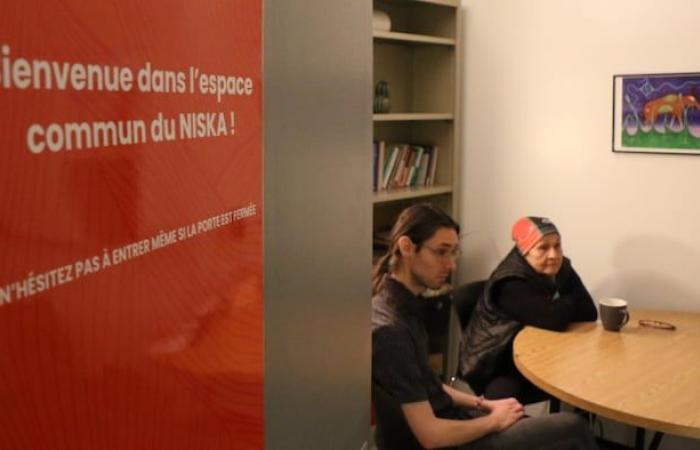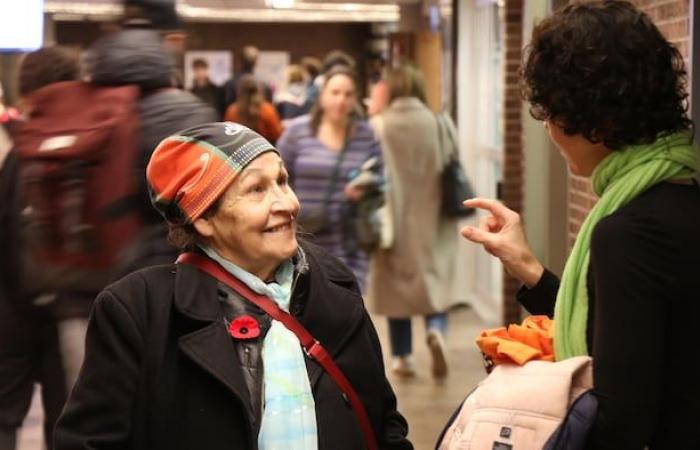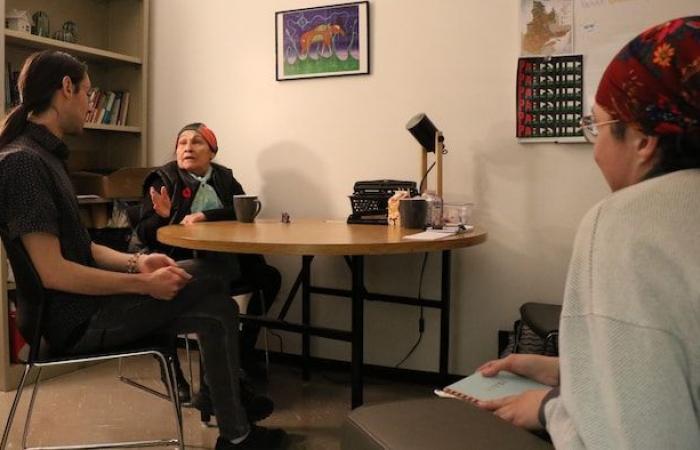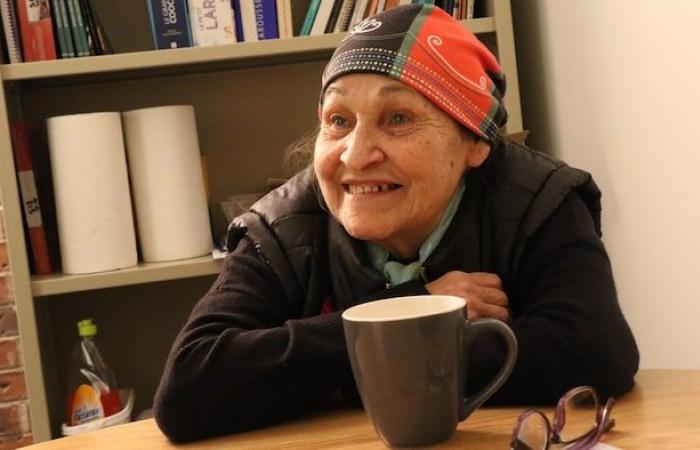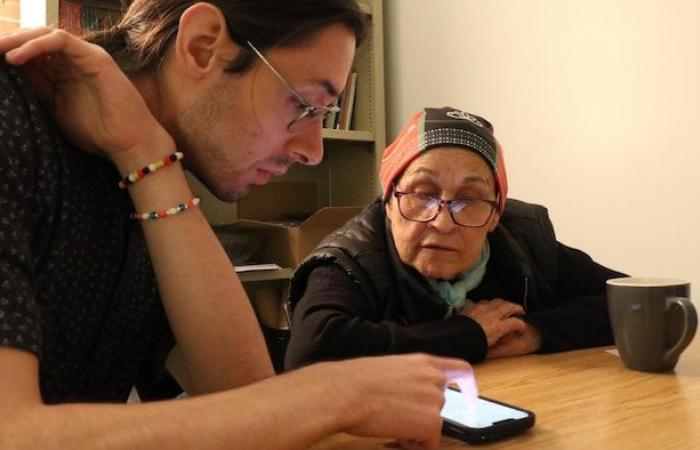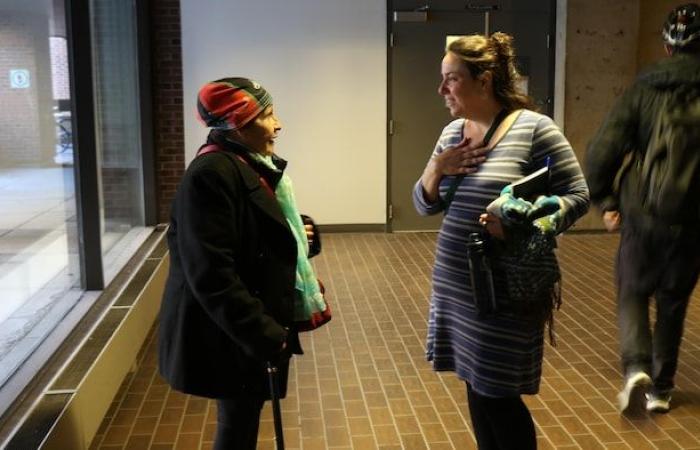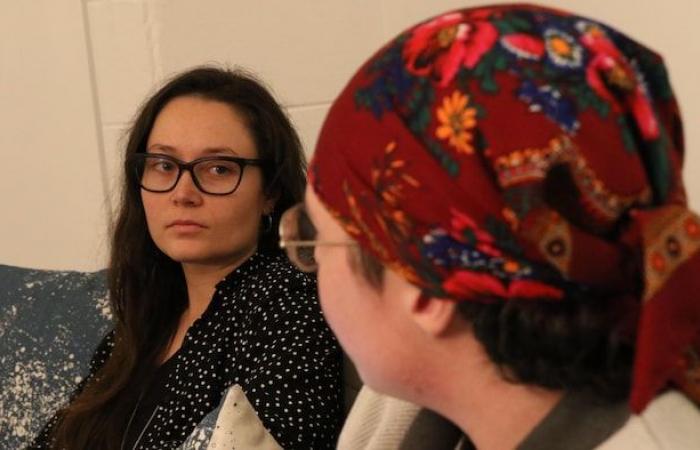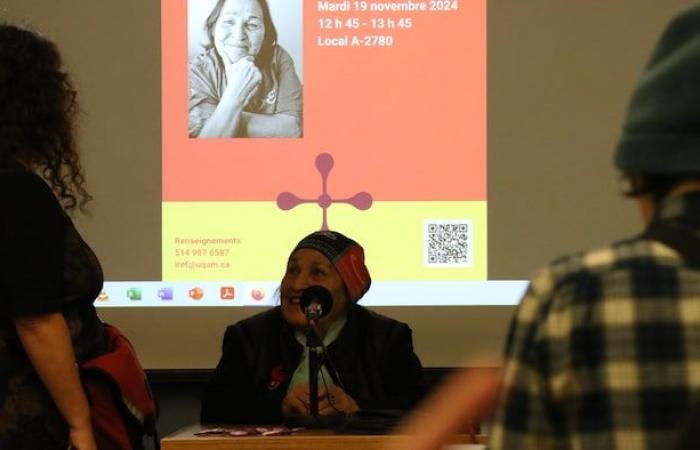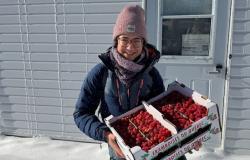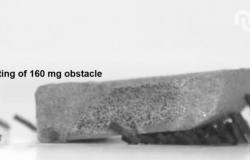The nomad walks around the campus, gives classes, lectures, and her steps regularly stop at the Niska room, where she listens to indigenous students. Far from her the idea of giving advice: she rather gives it “in a roundabout way”. For indigenous students, it is above all a “ law » which reassures and helps them.
It’s not like a jobshe says. I’m here to be there. As I don’t walk on lichen, today I walk in the corridors of theUQAM.
The silhouette of the one who wrote, in Uiesh, Somewhere, I have the backs of ancestral women, the bowed legs of those who carried, of those who gave birth while walking
is recognizable in the corridors of the university.
Her step is slower and it forces those who accompany her to change speed and even stop, because she is often stopped for a photo or an exchange.
It’s not because I’m walled in concrete that teaching is different
she explains, oat milk coffee in hand, around a table at Niska, the space intended for first peoples students.
Open in full screen mode
Niska, which means “bustard” in the Atikamekw language, is a space specially designed for Indigenous students.
Photo: - / Marie-Laure Josselin
His teaching is vast and is often based on bathing – which means “inland” in Innu-aimun – and the encounters she had there.
When you talk about bathing, you no longer see the walls, because automatically, you find yourself on the territory
specifies the eldest.
A man interrupts the discussion. He works for an indigenous organization and wants to speak to her when she has time. Joséphine always answers in the affirmative. I am very accessible. When someone talks to me, I try to get the answer, otherwise I address it to someone.
Once, a hot-tempered foreign student came to him for advice. All kinds of people come to talk to me.
Open in full screen mode
For her, her role as an elder in residence is also to respond to people who question her.
Photo: - / Marie-Laure Josselin
Joséphine Bacon agreed to be an elder in residence without really knowing what to expect. She just told herself that she had to be there, available, listening to everyone, because it does not only concern Indigenous people
.
Finally, its role is also to continue the oral tradition. I listen and I hope to leave a little trace, to leave the trace of the elders by telling what they gave me.
The transmission
Around the table at the local Niska, at first, there are only two people, but others will be added, for a coffee, a question, or finally to stay and sit discreetly in the sofa.
Why are they there? They don’t have time to respond, Joséphine says: For the funthat’s mostly it. For the pleasure of being together, that’s all.
Xan Choquet, originally from the Innu community of Mashteuiatsh, grew up near his community and is eager for questions about his culture, Innu-aimun. While Xan asks him a simple question about how to tell a story and what words to use, Joséphine Bacon tells him: Uapmatshekman
, which means look at your reflection
before heading off to a history and language class.
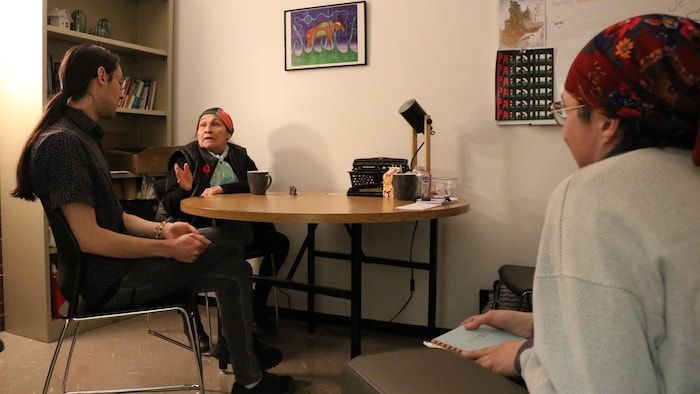
Open in full screen mode
The Niska premises are not very large, but friendly and perfect for starting conversations where everyone can ask questions and suggest thoughts.
Photo: - / Marie-Laure Josselin
The answer to questions is rarely straightforward. Here, the place is for teaching, for the famous ricochet advice
that Joséphine evokes. When she talks to you about bathingyou feel there. It transports me and allows me to learn more about my culture
specifies Xan.
After our discussions, I feel more validated, especially coming from someone who has so much knowledge of elders; It’s very rich to pass this on to us.
The law
When it’s not a joke that triggers general laughter, Joséphine always has the right word. That’s it. The elders give you peace, they will answer your question with a story that will lead you to your answer
Josephine told him.
At first, I came to learn Innu, but in the end, it’s much more than that. It’s a law [grand-mère] in residence!
To indigenous students who are far from home, or even to some who do not know the reality of the communities, Joséphine does good
. We can chat, but also talk about our business and she will understand
relate Xan.

Open in full screen mode
Joséphine Bacon is very attentive and always finds the right words, punctuating her interventions with laughter.
Photo: - / Marie-Laure Josselin
There are not necessarily reasons to come and talk to you
adds Philippe Bélanger-Beaudry, who is doing a master’s degree in history and is following a short program in pedagogy. Joséphine and he look at each other. We’re together, we talk.
He continues by telling him the mention he has just received. I’m proud of you! The beautiful portage trail
she tells him tenderly.
Of Cree origin, Philippe’s mother was torn from her community, the First Nation Brunswick Housein Ontario. The young man only learned about his origins late and reconnected with his community recently, but has not yet gone there. In addition to learning about cultures and the territory, conversations with Joséphine provide her with different perspectives.
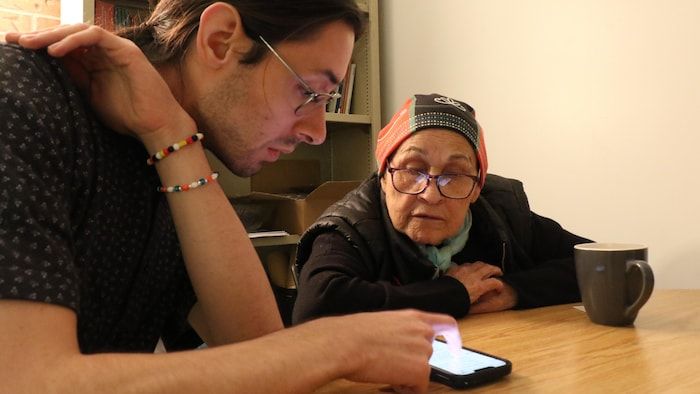
Open in full screen mode
Philippe Bélanger-Beaudry feels reassured with Joséphine, who can answer his multiple questions, whether philosophical, cultural or academic in nature.
Photo: - / Marie-Laure Josselin
Once, he even practiced for an interview with her. It helped me a lot, but most of the time, what does me the most good is the break from the routine of university, where you are very alone with yourself.
Chat, exchange, anything. Presence is important.
Philippe looks at Joséphine: Just your presence is reassuring. When you’re here, I feel better. It’s comforting.
More and more universities are hiring Indigenous elders in residence, such as Atikamekw Jacques Newashish at the University of Quebec at Trois-Rivières, Anishinabeg Gilbert Whiteduck at the University of Ottawa or Joséphine Bacon. According to the University of Windsor, the Elder in Residence is an Indigenous person who adopts the role of surrogate grandmother or grandfather and is available on campus to advise students, faculty and staff on mental, spiritual, emotional and physical health needs from a holistic Indigenous perspective. They are also found in other sectors, such as at the Institute of Gender and Health at the Canadian Institutes of Health Research.
According to the anthropologist and reception and integration advisor – Support for indigenous students atUQAM, Livia Vitenti, the role differs depending on the person and the university. You have to be there to those who need to vent, to offer a word of wisdom, a listening ear, but also to participate in activities such as beading, sharing circles
.

Open in full screen mode
Livia Vitenti and Joséphine Bacon chat while going to a conference.
Photo: - / Marie-Laure Josselin
She must be there in the activities of Niska, but also ofUQAM. It’s very varied
explains Livia, who supports Joséphine Bacon in her activity.
The answers
Livia Vitenti found that Joséphine’s presence provides a sense of belonging. Some students are in search of identity and the fact that Joséphine says: “yes, you can come”, it’s reassuring for them
.
Precisely, Fé Routhier, who has installed herself discreetly in the room, brings the subject to the table. She is there by chance
newly arrived and resurgence process
. Its indigenous origins were cut
. Her Mi’kmaw grandmother doesn’t want to talk about it. So she discusses it with Joséphine, who so well received
. The exchange focuses on the feeling of an imposter, with Fé Routhier indicating that he did not grow up in his community.
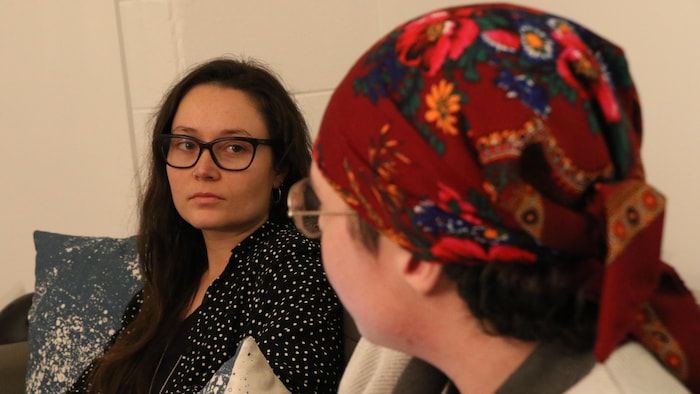
Open in full screen mode
Fé Routhier listens to Xan Choquet talking about the wolverine.
Photo: - / Marie-Laure Josselin
Joséphine replies that she doesn’t either, because she was at boarding school. The residential school was my community. It’s you young people who feel like an impostor.
There follows the pointed question of registration under subsections 6(1) or 6(2) of the Indian Act (New window). This time, Joséphine learns where to find the site on the Internet by observing Philippe leaning on his cell phone. We help each other
she declares.

Open in full screen mode
Giving lectures is also part of his role.
Photo: - / Marie-Laure Josselin
Joséphine closes the discussion and heads off into the maze of corridors of theUQAM to go give a conference among feminists
as she says. She doesn’t want to know the questions in advance so as not to take away the spontaneity of the answer.
Forty people, mainly students, wait for her and then listen attentively while she plays the question-and-answer game. Transmission is a way of telling what the other person has experienced. So that the word never dies.
She punctuates her response by asking How’s it going?
triggering general hilarity.

